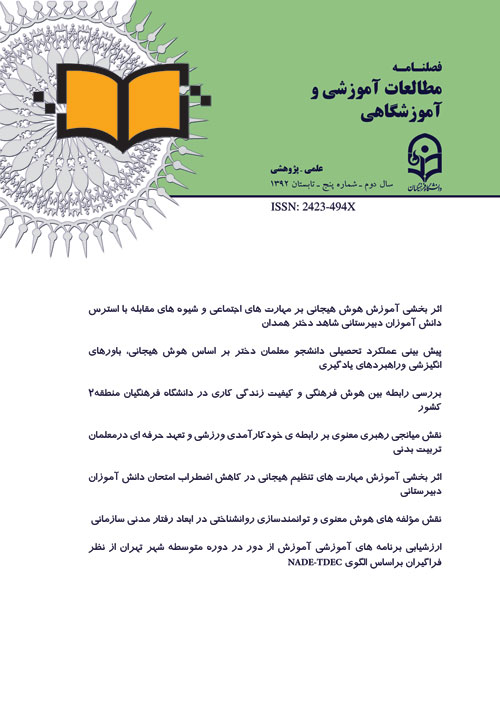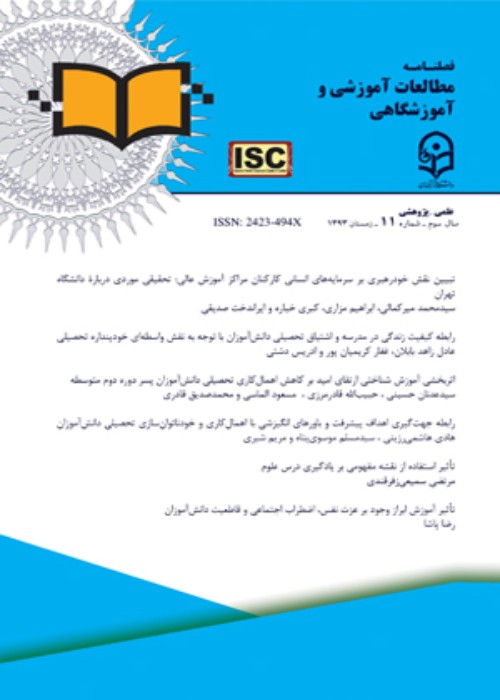فهرست مطالب

فصلنامه مطالعات آموزشی و آموزشگاهی
پیاپی 5 (تابستان 1392)
- تاریخ انتشار: 1392/05/08
- تعداد عناوین: 7
-
-
صفحه 1پژوهش حاضر یک مطالعه شبه تجربی است که به منظور مقایسه اثربخشی آموزش هوش هیجانی بر مهارت های اجتماعی و شیوه مقابله با استرس در دانش آموزان انجام گرفته است. جامعه آماری پژوهش تمامی دانش آموزان دختر شاهد مقطع دبیرستان شهر همدان در سال تحصیلی 89-90 میباشند که نمونه ای به حجم 30 نفر به روش تصادفی ساده انتخاب و بطور تصادفی در دو گروه آموزش هوش هیجانی و گواه قرار گرفتند. ابزار گردآوری داده ها را پرسشنامه های مهارت اجتماعی ایندربیتزن و فوستر (1992) و شیوه های مقابله با استرس اندلر و پارکر (1990) تشکیل می دهد. پرسشنامه مهارتهای اجتماعی و شیوه مقابله با استرس به عنوان پیش آزمون و پس آزمون اجرا گردیدند. افراد گروه آموزش هوش هیجانی 12 جلسه ساختار یافته 90 دقیقه ای در هر هفته به مدت 2 ماه شرکت کردند ولی گروه گواه هیچ آموزشی را دریافت نکرد. به منظور تجزیه و تحلیل داده ها در سطح آمار توصیفی از میانگین و انحراف استاندارد و در سطح آمار استنباطی از تحلیل کوواریانس چند متغیره استفاده شده است. نتایج یافته ها نشان داد که آموزش هوش هیجانی بر مهارتهای اجتماعی و شیوه های مقابله با استرس (مساله مداری و اجتنابی) شدت اثر بالایی دارد اما بر شیوه هیجان مداری شدت اثر پایینی دارد. میتوان نتیجه گرفت که آموزش هوش هیجانی بر افزایش مهارت های اجتماعی و اتخاذ شیوه های مقابله با استرس کارآمد و موثر است.
کلیدواژگان: آموزش هوش هیجانی، مهارتهای اجتماعی، شیوه مقابله با استرس
-
Page 1EQ, as one of the most important phenomenon in our daily life, is the last revolution and invention on the relationship between thought and emotion. This study aims to investigate the effect of EQ training on social skills and the Methods of Stress Management. In this quasi -experimental study, 30 participants selected from among the female students of the Shahed secondary high school in Hamedan city and they occur in two groups through the random sampling (treatment-control). In this study two questionnaires as pretest and posttest were administered i.e., Inderbitzen and Foster’s(1992) Social Skills questionnaire and Endler and Parker’s(1990) Coping Inventory for Stressful Situations. The students of treatment group participated in 12 ninety- minute sessions which held every week and lasted two months, approximately, however, the control group received no training. Data were analyzed via descriptive statistics (mean score and standard deviation) and inferential ones (multivariable covariance analysis). Findings reveal although EQ training has the high level of effect on social skills and the methods of stress management but has the lowest effect on emotion focused. It is concluded that EQ training has a significant effect on improving social skills and decision methods of stress management.Keywords: EQ training, Social Skills, Stress Management Methods
-
Page 16This study aims to determine the role of emotional intelligence elements, motivational beliefs and learning strategies in academic performance of pre-service teachers. Bar-on Emotional Intelligence Inventory and Self-regulation strategies (MSLQ) as two standard questionnaires administered among one-hundred and thirty pre-service teachers who were selected randomly from the target population. Moreover, their GPA (grade point average) in first semester was considered as their academic performance. In order to analyze the data, statistical indicators of mean, standard deviation, variance analysis and multiple regression techniques were run. Findings reveal that there is a significant relationship between academic performance and emotional intelligence; motivational beliefs and learning strategies, respectively. Furthermore, these four elements can predict the academic performance of pre-service teachers. It is concluded that through findings of this study, new windows for fundamentally consideration of teachers’ specific educations will be opened to make the desirable changes.Keywords: Emotional Intelligence, Learning Strategies, Motivational Beliefs, Pre, service Teachers
-
Page 36This study aims to investigate the relationship between cultural intelligence and the quality of working life at Farhangian University in second district of the country as a culturally diverse organization. In this descriptive and correlational study, 132 staffs through Kerjesi -Morgan Table in 2012-2013 were selected from among 200 active employees at Farhangian University based on stratified sampling. In this study 4-factor Cultural Intelligence and Walton Model (8 -item) as 2 standard, valid and reliable (r=0.85, r=0.84, respectively) questionnaires were administered. Finally, data were analyzed through the multivariate regression and it is concluded that there is a significant relationship between cultural intelligence (and its factors such as meta-cognitive, cognitive, motivational and behavioral) and work life quality.Keywords: Cultural Intelligence, Work life Quality, Metacognitive Cultural Intelligence, Cognitive Cultural Intelligence, Motivational Cultural Intelligence, Behavioral Cultural Intelligence
-
Page 58This study aims to investigate the mediator role of spiritual leadership on relationship between sports self-efficacy and professional commitment in physical education teachers. In this descriptive and correlational study, 3 valid and reliable questionnaires (teacher’s professional commitment Abmyr (1990), spiritual leadership Fry et al. (2005), and Self – efficacy and exercise habits survey Sallis et al (1988),) administered among 119 physical education teachers in Parsabad city of Ardabil. Then data were analyzed via Structural equation modeling. It is concluded although there is a significant relationship between sports self-efficacy and spiritual leadership, but the relationship between sports self-efficacy and professional commitment is not significant. Moreover, the mediator role ofspiritual leadership on relationship between sports self-efficacy and professional commitment in physical education teachers is confirmed.Keywords: Self, efficacy, Spiritual Leadership, Professional Commitment
-
Page 80This study aims to investigate the effectiveness of training the emotional adjustment skills on reducing test anxiety in secondary high school students. In this experimental study, 40 students selected from among all high school students of Tiran and Kervan city based on multi-stage cluster random sampling. They randomly assigned in to control and experimental groups and the latter one was trained emotional adjustment skills during eight ninety -minute sessions. Data collected through Phillip’s test anxiety and spilberger's clinical interview, then analyzed via covariance analysis method. Findings reveal there is a significant difference between mean score of experimental and control groups. (p<. /0005) and its effect size is 57 percent of the total variance of test anxiety. It is concluded that training the emotional adjustment skills reduce test anxiety. These results have important implications in field of training the emotional adjustment skills to prevent test anxiety.Keywords: Emotional Adjustment, Test Anxiety, Phillip's Test Anxiety Interview, Spilberger's Clinical Interview
-
Page 98This study aims to investigate the role of spiritual intelligence and psychological empowerment components on dimensions of organizational civil behavior. In this descriptive - correlational study, King Spiritual Intelligence Self-Report Inventory (2008), Spitzer Cognitive Empowerment Questionnaire (1995) and Hill Organizational Citizenship Behavior Questionnaire (2002) were administered among 234 high school teachers of Zanjan City selected based on stratified random sampling. Then, data analyzed through Pearson correlation and stepwise regression methods. Findings reveal that there is a significant relationship between spiritual intelligence and organizational civil behavior, and also the components of spiritual intelligence can explain teacher’s helping behavior (P<0/001, R2=0/23). Moreover, the predictive components of personal meaning-making and transcendental awareness, in addition to tolerability (P<0/001, R2=0/14), expansion of self-consciousness and critical thinking can explain significantly teachers’ civil virtue (P<0/001, R2=0/19). Also, the Predictive variable of psychological empowerment, can significantly explain the variance of the overall organizational civil behavior (P<0/001, R2=0/33).Keywords: Spiritual Intelligence, Psychological Empowerment, Organizational Civil, Behavior, Critical Thinking, Transcendental Awareness, Personal Meaning, making, Expansion of Selfconsciousness
-
Page 124This study aims to evaluate distance education programs of Tehran secondary high schools from learners’ perspective based on NADE-TDEC model. In this descriptive- survey study a 40- item researcher-made and valid (r=0.882) questionnaire, based on NADE-TDEC model, were administered among 170 students selected from among 16275 based on multi-stage cluster random sampling. The data were put into SPSS software and descriptive and inferential statistics like independent t-test, paired sample ttest and variance analysis were run. Findings reveal regarding the weight mean of questions, inferential analysis, quality of material development and course contents, the quality of educational items and executive affairs are higher than the mean level, but the quality of new educational technologies which is used is below the mean level.Keywords: Distance Education, Evaluation, Secondary High school, NDE, TDEC Model


